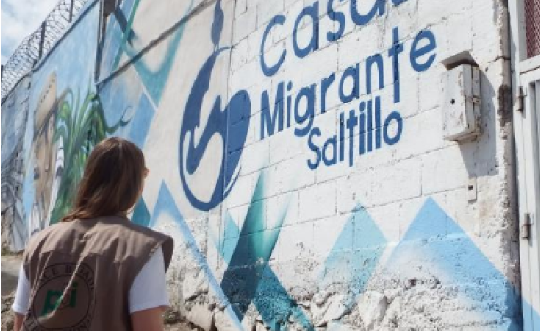Canada appealing court ruling on the Safe Third Country Agreement a step backwards for human rights
Written by: Brent Patterson
If it had not been for the pandemic, Peace Brigades International-Canada would have hosted Javier Martinez Hernandez, the legal coordinator of the Saltillo Migrant Shelter, at meetings in Toronto, Ottawa and Montreal from March 14-18 to discuss a range of migrant rights issues including the Safe Third Country Agreement.
In practical terms, the Canada-US Safe Third Country Agreement has meant, for example, that a person from Mexico seeking asylum at a Canadian checkpoint on the US border would be denied entry because the US is deemed a safe third country.
On July 22, Federal Court Justice Ann Marie McDonald ruled that the Safe Third Country infringes on the section of the Canadian Charter of Rights and Freedoms that guarantees “the right to life, liberty and security of the person”.
Now, regrettably, the Canadian Press reports that the Canadian government is appealing the Federal Court decision.
It highlights: “[Public Safety Minister Bill] Blair says there are factual and legal errors in some of the Federal Court’s key findings, and the government wants to ensure clarity on the legal framework governing asylum law.”
In response, Amnesty International Canada Secretary General Alex Neve has commented: “This decision to appeal protracts Canada’s ongoing complicity in what is by any measure a full blow human rights crisis in the United States.”
Unfortunately, the appeal does not come as a surprise.
Prior to the court ruling the Canadian government had been in the process of “modernizing” (expanding) the Safe Third Country Agreement.
While the Safe Third Country Agreement means that Canadian officials can return a migrant seeking asylum at a border checkpoint, the United Nations Convention relating to the Status of Refugees means that asylum seekers entering Canada between border checkpoints are not automatically deported and may make asylum claims.
In April 2018, Reuters reported: “Canada wants the [Safe Third Country] agreement rewritten to apply to the entire border.”
“Canadian officials first discussed changing the pact with U.S. Department of Homeland Security officials last September… ‘We’d like to be able to get them to agree that we can, if somebody comes across, we just send them back’, the official told Reuters, adding Canada had raised the issue ‘at least a dozen’ times since.”
That article adds: “The Canadian official compared Canada’s position to U.S. requests that Mexico prevent migrants traversing its territory from entering the United States.”
That border, now even more heavily militarized by Mexico because of those US requests, compounds a massive human rights crisis.
In May 2017, Médecins Sans Frontières (Doctors Without Borders) noted: “68.3 percent of the migrant and refugee populations entering Mexico reported being victims of violence during their transit toward the United States [and] nearly one-third of the women surveyed had been sexually abused during their journey.”
That report explained: “MSF patients reported that the perpetrators of violence included members of gangs and other criminal organizations, as well as members of the Mexican security forces responsible for their protection.”
It is migrants such as these who are supported by the Saltillo Migrant Shelter that is accompanied by the Peace Brigades International-Mexico Project.
PBI-Mexico has noted: “The Saltillo Migrant Shelter offers daily humanitarian assistance — including clothes, medicines, food, rest, and medical and psychological care — to hundreds of migrants crossing Mexico to reach the United States.”
PBI-Mexico has further highlighted: “[The shelter] also defends migrants’ rights through the documentation of cases of kidnapping, extortion, abuses and violations that they suffer during their journey through Mexico. The organization lodges complaints about violations after gathering migrants’ testimonies.”
While the Prime Minister directed Minister Blair as recently as this past December to “modernize the Safe Third Country Agreement”, that direction along with the appeal of the court ruling is a step backwards and risks an infringement of the human rights Canada has previously affirmed in the UN Refugee Convention.
More Articles




